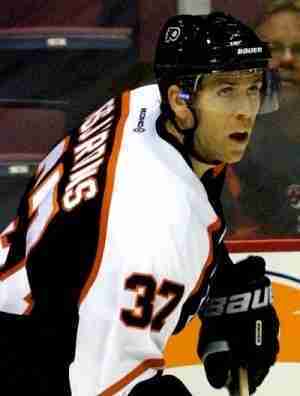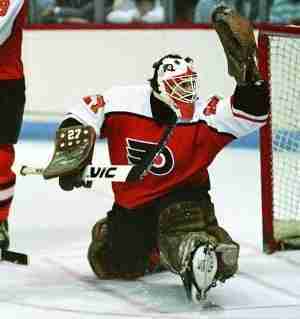Warning: Attempt to read property "params" on null in /home/notinhal/public_html/plugins/k2/k2canonical/k2canonical.php on line 382
186. Simon Gagne
75. Eric Desjardins
A solid two-way defenseman, Eric Desjardins was one of the better players behind the blue line during the 1990s. Desjardins could help stop the puck as well as help put it in the net. He won a Stanley Cup with the Habs in 1993 and upon being traded to Philadelphia he was even more productive. He was easily their best defenseman and was good enough to represent Canada on three World Class National teams. Desjardins was a star, and with 575 career points he could receive a look, but chances are that will be all he will receive.
55. Rick Tocchet
When Rick Tocchet entered the National Hockey League, he seemingly did so with the strength of his pugilistic skills. Tocchet still fought, but by his fourth season he emerged as an effective scorer as well. Tocchet was as hard nosed as they came and was the quintessential power forward of the game. The popular winger won a Stanley Cup with Pittsburgh and though he played for six different teams throughout his career he was always among the more popular. Tocchet did score a lot of points, but it may not have been enough to gain entry. Let’s hope that Rick Tocchet isn’t betting on his chances.
8. John LeClair
Some have said that John LeClair got off to a slow start in the NHL. There is certainly a level of truth to that as his stint with the Habs showed his defensive skill but not any real offensive proficiency. Upon becoming a Philadelphia Flyer, LeClair really began to use his size and mobility. He was placed on a line with Eric Lindros and Michael Renberg and the line dubbed the “Legion of Doom” became a highlight reel staple with their goals and bruising nature. LeClair became the first American to net 50 goals three seasons in a row. The question for the Hall is did John LeClair’s Broad Street tenure do enough to secure a spot.
60. Ron Hextall
It is funny how Ron Hextall may be known more for the one goal (though he did do it again in a playoff game) he scored as opposed to the many he prevented. Hextall was a fearless player who had no qualms leaving the net showcasing his skating acumen. In addition to being one of the game’s most mobile netminders, he was also among the most aggressive. Opposing players were wary of Hextall’s stick as he was known to slash at anyone who dared cross his path.
46. Brian Propp
In 1999 Master Card named the all Canadian Junior Hockey Team. This team featured current Hall of Famers, Wayne Gretzky, Mario Lemieux, Guy LaFleur, Denis Potvin, Bobby Orr, and Bernie Parent. It also featured Saskatchewan native Brian Propp who lit up the lights for the Brandon Wheat Kings. Propp’s first NHL season saw him on a line with Bobby Clarke and Reggie Leach. He held his own and for the next ten years, he was a consistent offensive threat on Broad Street.
69. Tim Kerr
Although it can be argued that almost all hockey players take a pounding from the game, few may have put themselves in harms way more than Tim Kerr. Dubbed “the Sultan of Slot”, Kerr would park himself in from the net and do whatever it took to get the puck in the net. He was criticized by some for scoring what was considered a high amount of “garbage” goals, but the fact is that Kerr netted 50 plus goals four seasons in a row and anyone who can do that is certainly a valuable commodity regardless of the era. Kerr still holds the NHL record for 34 Power Play goals in one season. His style of play finally caught up with him and he was only able to play 655 games (which on this list is relatively low) but did score 370 goals. Although his stats were solid, there are pundits who will look down as to how he got it and it may be enough to prevent Tim Kerr from gaining induction.
37. Reggie Leach
Reggie Leach was one of the more prolific scorers in the Western Junior Hockey League. He was able to perform similar feats in the NHL, primarily when he arrived to the Philadelphia Flyers and joined the Broad Street Bullies. Interestingly, Leach’s best season may have been his most frustrating. Leach scored the most goals in the 1975-76 season (61) and led his team to a Stanley Cup appearance. Despite scoring 16 goals in the playoffs and winning the Conn Smythe Trophy, his Flyers failed to win the Cup that year. Leach would go on to gain 666 points in the NHL and had he been a better playmaker he would have a points total that may have garnered a look from the Hall.










